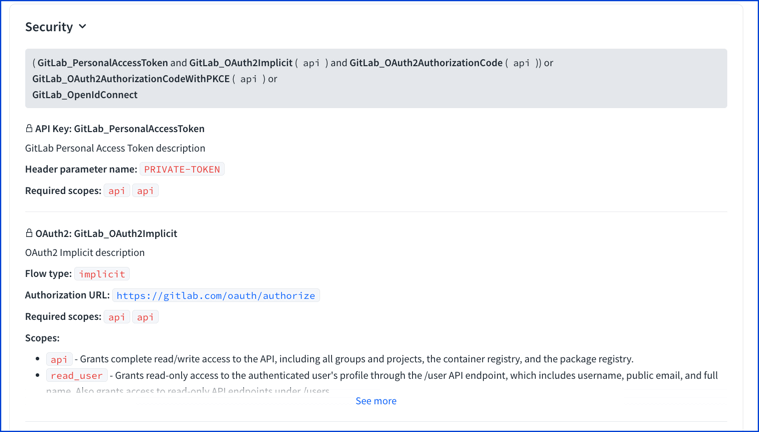Excerpt from the OpenAPI 3.1 specification about the security scheme object
Defines a security scheme that can be used by the operations.
Supported schemes are HTTP authentication, an API key (either as a header, a cookie parameter or as a query parameter), mutual TLS (use of a client certificate), OAuth2's common flows (implicit, password, client credentials and authorization code) as defined in RFC6749, and OpenID Connect Discovery. Please note that as of 2020, the implicit flow is about to be deprecated by OAuth 2.0 Security Best Current Practice. Recommended for most use case is Authorization Code Grant flow with PKCE.
| Field Name | Type | Applies To | Description |
|---|---|---|---|
| type | string | Any | REQUIRED. The type of the security scheme. Valid values are "apiKey", "http", "mutualTLS", "oauth2", "openIdConnect". |
| description | string | Any | A description for security scheme. CommonMark syntax MAY be used for rich text representation. |
| name | string | apiKey | REQUIRED. The name of the header, query or cookie parameter to be used. |
| in | string | apiKey | REQUIRED. The location of the API key. Valid values are "query", "header" or "cookie". |
| scheme | string | http | REQUIRED. The name of the HTTP Authorization scheme to be used in the Authorization header as defined in RFC7235. The values used SHOULD be registered in the IANA Authentication Scheme registry. |
| bearerFormat | string | http ("bearer") | A hint to the client to identify how the bearer token is formatted. Bearer tokens are usually generated by an authorization server, so this information is primarily for documentation purposes. |
| flows | OAuth Flows Object | oauth2 | REQUIRED. An object containing configuration information for the flow types supported. |
| openIdConnectUrl | string | openIdConnect | REQUIRED. OpenId Connect URL to discover OAuth2 configuration values. This MUST be in the form of a URL. The OpenID Connect standard requires the use of TLS. |
This object MAY be extended with Specification Extensions.
{
"type": "http",
"scheme": "basic"
}type: http
scheme: basic{
"type": "apiKey",
"name": "api_key",
"in": "header"
}type: apiKey
name: api_key
in: header{
"type": "http",
"scheme": "bearer",
"bearerFormat": "JWT",
}type: http
scheme: bearer
bearerFormat: JWT{
"type": "oauth2",
"flows": {
"implicit": {
"authorizationUrl": "https://example.com/api/oauth/dialog",
"scopes": {
"write:pets": "modify pets in your account",
"read:pets": "read your pets"
}
}
}
}type: oauth2
flows:
implicit:
authorizationUrl: https://example.com/api/oauth/dialog
scopes:
write:pets: modify pets in your account
read:pets: read your petsThe visuals are screenshots from the Try it console.
A security panel displays with each operation.

Select the security panel to expand the detailed security definition.

For operations that use multiple security schemes, Redocly displays a summary followed by the description of each security definition. If the description is too long, Redocly displays a truncated description with a See more link.

The Try it panel shows username and password fields with http basic security.

The following security scheme describes http bearer security.
components:
securitySchemes:
JWT:
description: JWT bearer token description...
type: http
scheme: bearer
bearerFormat: JWTThe security description shows the http bearer description.

The Try it shows a field to enter the bearer token.

The following security scheme describes an apiKey in the header security.
components:
securitySchemes:
GitLab_PersonalAccessToken:
description: GitLab Personal Access Token description
type: apiKey
name: PRIVATE-TOKEN
in: headerThe security description shows the header parameter name. 
The Try it panel shows the corresponding API key field. 
See the OAuth Flows object for examples.
NamedSecuritySchemes(map of strings toSecurityScheme)SecuritySchemeSecuritySchemeFlows
const SecurityScheme: NodeType = {
properties: {
type: { enum: ['apiKey', 'http', 'oauth2', 'openIdConnect'] },
description: { type: 'string' },
name: { type: 'string' },
in: { type: 'string', enum: ['query', 'header', 'cookie'] },
scheme: { type: 'string' },
bearerFormat: { type: 'string' },
flows: 'SecuritySchemeFlows',
openIdConnectUrl: { type: 'string' },
},
required(value) {
switch (value?.type) {
case 'apiKey':
return ['type', 'name', 'in'];
case 'http':
return ['type', 'scheme'];
case 'oauth2':
return ['type', 'flows'];
case 'openIdConnect':
return ['type', 'openIdConnectUrl'];
default:
return ['type'];
}
},
allowed(value) {
switch (value?.type) {
case 'apiKey':
return ['type', 'name', 'in', 'description'];
case 'http':
return ['type', 'scheme', 'bearerFormat', 'description'];
case 'oauth2':
return ['type', 'flows', 'description'];
case 'openIdConnect':
return ['type', 'openIdConnectUrl', 'description'];
default:
return ['type', 'description'];
}
},
extensionsPrefix: 'x-',
};